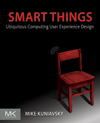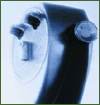Thanks to Tim O'Reilly's generous promotion of my Etech talk, the concept of information shadows has been mentioned a bit in the last couple of weeks.
I'm very flattered, and although the coinage of the specific term is roughly mine, I did not originate the concept. The idea of data entities associated with objects, but having lives of their own, probably goes back as far as the oldest identification technologies, but there are several precedents that deserve mention (especially Adam Greenfield's). Here's a tiny bibliography of two of them (and thank you Google Scholar for helping me find them).
Data shadow
Westin, Alan F. 1967. Privacy and Freedom. (this is a very early coinage, probably resulting from the same reaction to computerization as the anti punch-card protests in Berkeley in the 60s, but that's just a hypothesis)More modern references can be found at Word Spy
Informational Shadow
Baird, D. "The Thing-Y-Ness Of Things: Materiality And Spectrochemical Instrumentation, 1937-1955." In The Empirical Turn in the Philosophy of Technology (Kroes, Meijers, Mitcham editors), 2000 (this is a philosophy of science paper that argues that physical manifestation of an idea matters; he criticizes the distant relationship we have with material culture--"Forget the steel, what we want is its informational shadow.")Davidson, Paul, and Louise Davidson. The Collected Writings of Paul Davidson. 1990. (this is a collection of macroeconomic essays, one of which says that we can't make judgments about the future because it does not cast an informational shadow back toward us--this is a very different use of the term, but still obliquely related)
Greenfield, Adam. Everyware, 2006 (My information shadow is nearly identical to Adam's informational shadow. In Everyware, he writes: "The significance of technologies like RFID and 2D barcoding is that they offer a low-impact way to "import" physical objects into the datasphere, to endow them with an informational shadow.")



